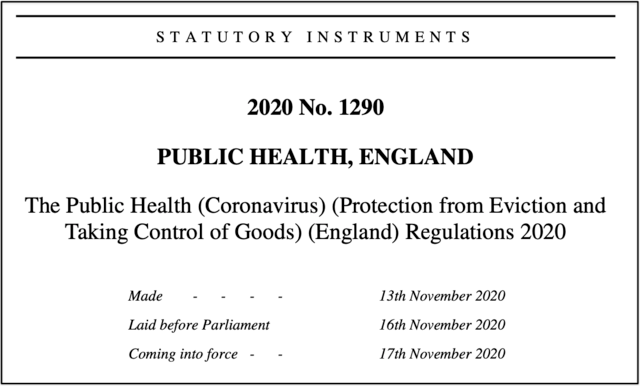As previously reported, the government had announced that the enforcement of possession would be suspended in any high tier areas and then during the lockdown in England. It was also said that enforcement of possession orders would also be suspended over the Christmas period.
At first instance, the suspension was done by a letter from the Lord Chancellor to the High Court Enforcement Officers Association where it was requested that they suspend enforcement activity in the higher-tier areas (pre-lockdown).
Then, a further letter was sent the same which had further details and extended during lockdown.
However. Many legal advisors (including the articles linked above) questioned the legal validity of the Lord Chancellor simply issuing a letter to the High Court Enforcement Officers Association.
David Smith of JMW Solicitors said:
The problem with all of this is that it is almost certainly unlawful. It is not open to Bailiffs or HCEOs to simply decline to enforce warrants and writs, even if the Lord Chancellor asks them to do so. They have a duty to do this. Indeed, there is a power to complain to the County Court, in the County Courts Act, about losses resulting from Bailiffs not enforcing warrants.
David Smith of JMW received instructions to send a pre-action protocol letter threatening Judicial Review to the Ministry of Justice.
You can read all about this here.
Afterwards, the government have introduced legislation suspending enforcement action on most possession orders.
As of today (17 November 2020), The Public Health (Coronavirus) (Protection from Eviction and Taking Control of Goods) (England) Regulations 2020 are in force and apply to England only.
The regulations provide that except for a few specific cases, no person (including a bailiff) may attend at a dwelling house for the purpose of—
- executing a writ or warrant of possession;
- executing a writ or warrant of restitution; or
- delivering a notice of eviction.
There is an exception (so enforcement may continue) if the case involves substantial rent arrears and the notice, writ or warrant relates to an order for possession made wholly or partly on ground 1, 8, 10, 11 or case 1 Rent Act 1977.
Substantial rent arrears means if the amount of unpaid rent arrears outstanding at the date on which the order for possession is granted is at least an amount equivalent to 9 months’ rent and any unpaid rent arrears accrued after 23rd March 2020 must be disregarded.
Other exemptions include (limited to relevant for our readers) where the notice, writ or warrant relates to an order for possession made-
- against trespassers pursuant to a claim to which rule 55.6 (service of claims against trespassers) of the Civil Procedure Rules 1998
- wholly or partly on Ground 7A, Ground 14, Ground 14A or Ground 17 in Schedule 2 (grounds for possession of dwelling houses let on assured tenancies) to the Housing Act 1988;
- wholly or partly under case 2 of Schedule 15 (grounds for possession of dwelling-houses let on or subject to protected or statutory tenancies) to the Rent Act 1977; or
- wholly or partly on Ground 7 in Schedule 2 to the Housing Act 1988 (but in this case, the person attending must take reasonable steps to satisfy themselves that the dwelling house is unoccupied before delivering a notice of eviction, executing a writ or warrant of possession or, executing a writ or warrant of restitution).
The regulations will end on 11 January 2021 after which enforcement should resume (unless further legislation is brought in of course).
Read more information for landlords and agents regarding Coronavirus on our hub page.




